Mingjiang Wang
Selective State Space Model for Monaural Speech Enhancement
Nov 09, 2024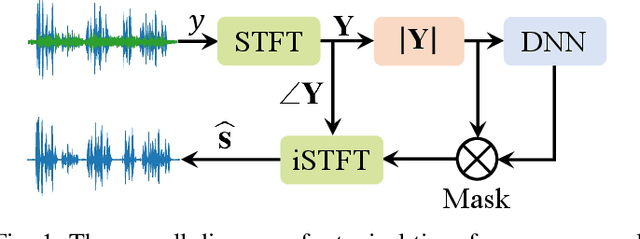

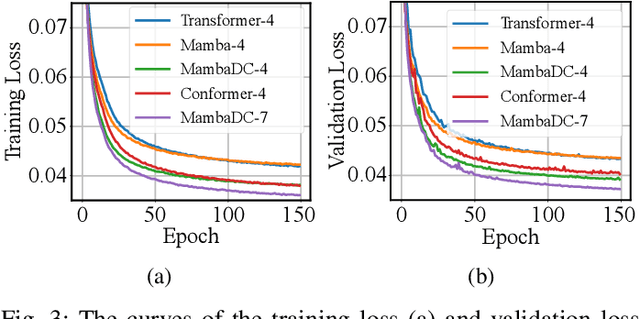
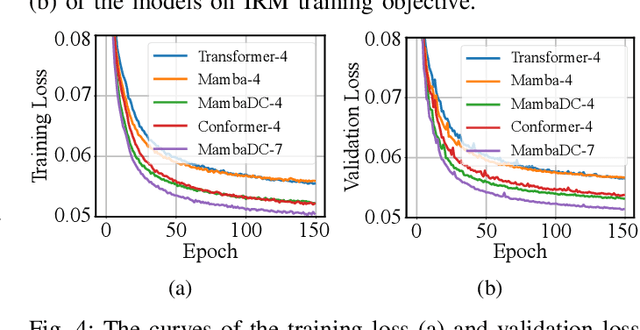
Abstract:Voice user interfaces (VUIs) have facilitated the efficient interactions between humans and machines through spoken commands. Since real-word acoustic scenes are complex, speech enhancement plays a critical role for robust VUI. Transformer and its variants, such as Conformer, have demonstrated cutting-edge results in speech enhancement. However, both of them suffers from the quadratic computational complexity with respect to the sequence length, which hampers their ability to handle long sequences. Recently a novel State Space Model called Mamba, which shows strong capability to handle long sequences with linear complexity, offers a solution to address this challenge. In this paper, we propose a novel hybrid convolution-Mamba backbone, denoted as MambaDC, for speech enhancement. Our MambaDC marries the benefits of convolutional networks to model the local interactions and Mamba's ability for modeling long-range global dependencies. We conduct comprehensive experiments within both basic and state-of-the-art (SoTA) speech enhancement frameworks, on two commonly used training targets. The results demonstrate that MambaDC outperforms Transformer, Conformer, and the standard Mamba across all training targets. Built upon the current advanced framework, the use of MambaDC backbone showcases superior results compared to existing \textcolor{black}{SoTA} systems. This sets the stage for efficient long-range global modeling in speech enhancement.
FB-MSTCN: A Full-Band Single-Channel Speech Enhancement Method Based on Multi-Scale Temporal Convolutional Network
Mar 15, 2022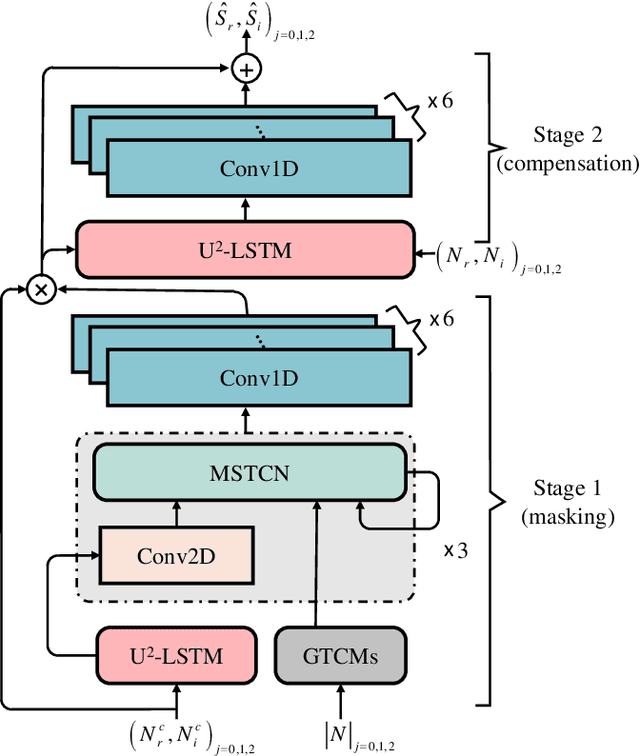
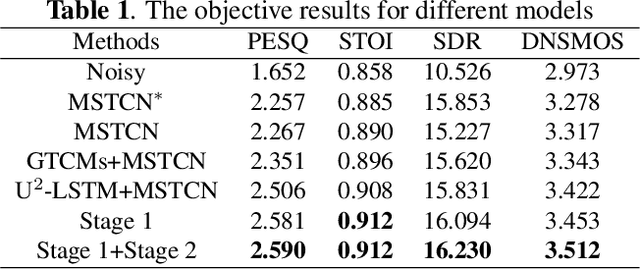


Abstract:In recent years, deep learning-based approaches have significantly improved the performance of single-channel speech enhancement. However, due to the limitation of training data and computational complexity, real-time enhancement of full-band (48 kHz) speech signals is still very challenging. Because of the low energy of spectral information in the high-frequency part, it is more difficult to directly model and enhance the full-band spectrum using neural networks. To solve this problem, this paper proposes a two-stage real-time speech enhancement model with extraction-interpolation mechanism for a full-band signal. The 48 kHz full-band time-domain signal is divided into three sub-channels by extracting, and a two-stage processing scheme of `masking + compensation' is proposed to enhance the signal in the complex domain. After the two-stage enhancement, the enhanced full-band speech signal is restored by interval interpolation. In the subjective listening and word accuracy test, our proposed model achieves superior performance and outperforms the baseline model overall by 0.59 MOS and 4.0% WAcc for the non-personalized speech denoising task.
Incorporating Multi-Target in Multi-Stage Speech Enhancement Model for Better Generalization
Jul 09, 2021
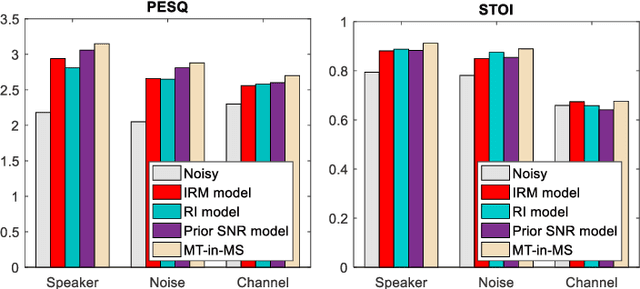


Abstract:Recent single-channel speech enhancement methods based on deep neural networks (DNNs) have achieved remarkable results, but there are still generalization problems in real scenes. Like other data-driven methods, DNN-based speech enhancement models produce significant performance degradation on untrained data. In this study, we make full use of the contribution of multi-target joint learning to the model generalization capability, and propose a lightweight and low-computing dilated convolutional network (DCN) model for a more robust speech denoising task. Our goal is to integrate the masking target, the mapping target, and the parameters of the traditional speech enhancement estimator into a DCN model to maximize their complementary advantages. To do this, we build a multi-stage learning framework to deal with multiple targets in stages to achieve their joint learning, namely `MT-in-MS'. Our experimental results show that compared with the state-of-the-art time domain and time-frequency domain models, this proposed low-cost DCN model can achieve better generalization performance in speaker, noise, and channel mismatch cases.
Deep Interaction between Masking and Mapping Targets for Single-Channel Speech Enhancement
Jun 09, 2021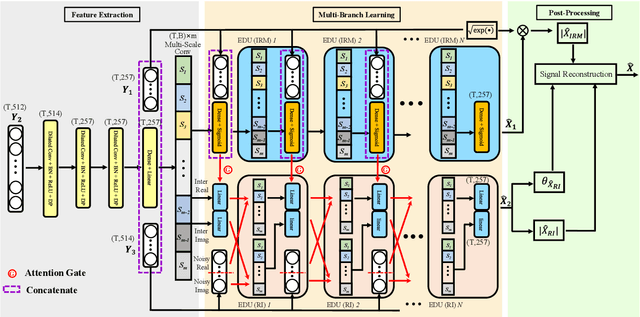
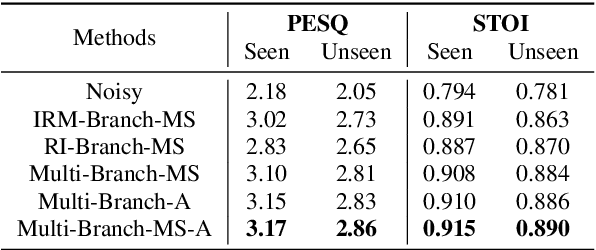

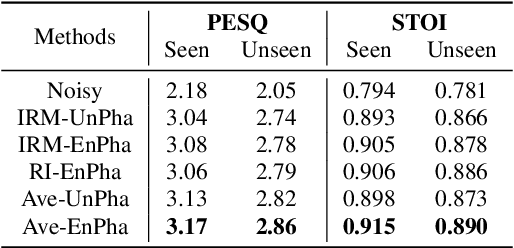
Abstract:The most recent deep neural network (DNN) models exhibit impressive denoising performance in the time-frequency (T-F) magnitude domain. However, the phase is also a critical component of the speech signal that is easily overlooked. In this paper, we propose a multi-branch dilated convolutional network (DCN) to simultaneously enhance the magnitude and phase of noisy speech. A causal and robust monaural speech enhancement system is achieved based on the multi-objective learning framework of the complex spectrum and the ideal ratio mask (IRM) targets. In the process of joint learning, the intermediate estimation of IRM targets is used as a way of generating feature attention factors to realize the information interaction between the two targets. Moreover, the proposed multi-scale dilated convolution enables the DCN model to have a more efficient temporal modeling capability. Experimental results show that compared with other state-of-the-art models, this model achieves better speech quality and intelligibility with less computation.
 Add to Chrome
Add to Chrome Add to Firefox
Add to Firefox Add to Edge
Add to Edge